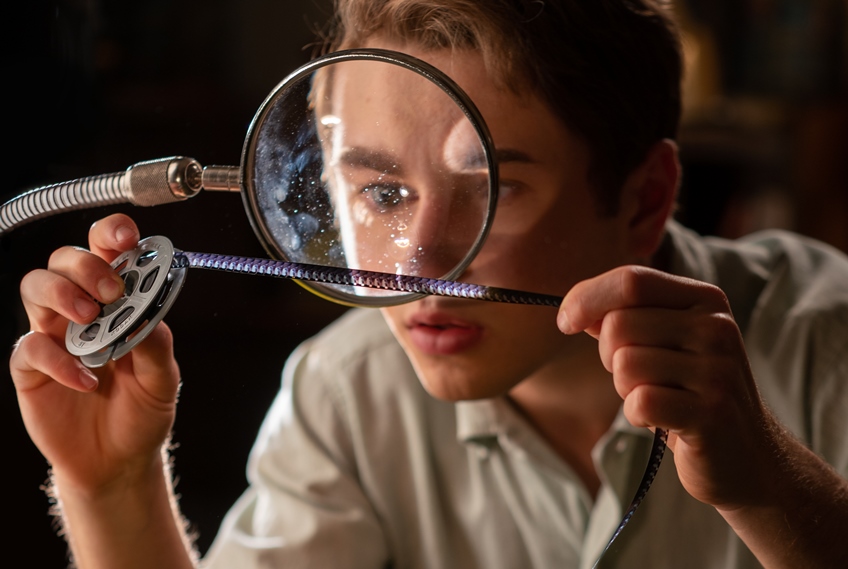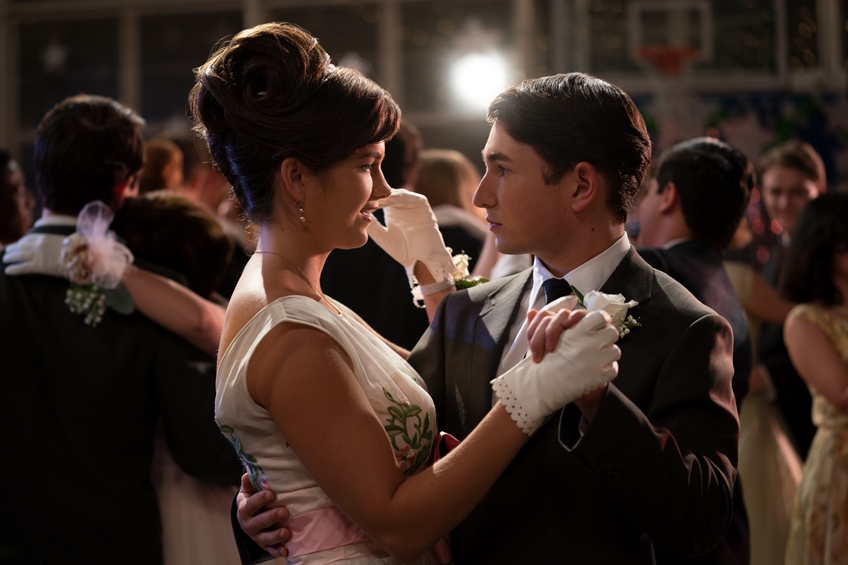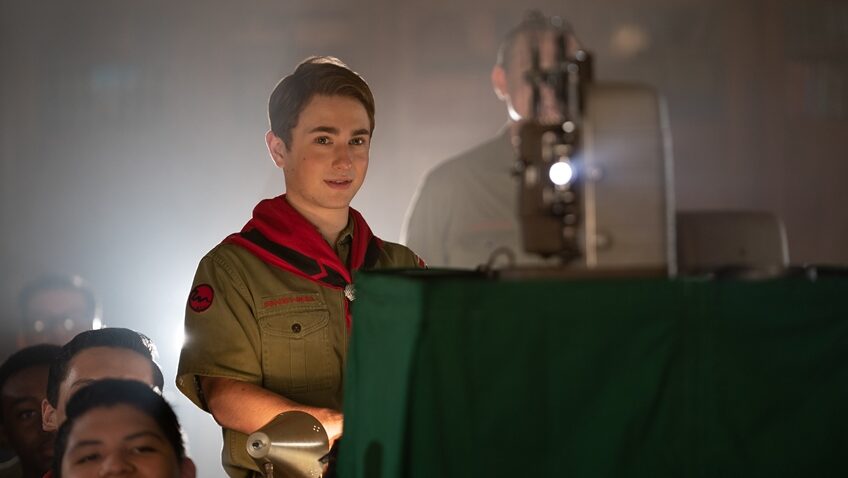Joyce Glasser reviews The Fabelmans (January 27, 2023) Cert 12A, 151 mins.
If Hugo was 80-year-old Martin Scorsese’s love letter to cinema, The Fabelmans is 76-year-old Steven Spielberg’s. But Spielberg personalises this love in a way he’s never done before. At 74, he teamed up with Tony Kushner (Angels in America) to co-write a Bildungsroman and direct his first coming-of-age-story.
It’s a tale worth telling: how a boy from a loving, if borderline dysfunctional, family in Cincinnati, with no links to the film industry, became a three-time Academy Award winning director and the most commercially successful director of all time. When The Fabelmans dramatises how moments in Spielberg’s troubled youth fed into his films and vice-versa, it is magical and thrilling. But due to its episodic structure, there is a lack of tension and a sense of urgency that means it’s not always engaging.
The film opens on the evening of January 10, 1952, in Haddon Township New Jersey, 1952, when Mitzi (Michelle Williams) and Burt (Paul Dano) Febelman take their six-year-old son Sammy (Mateo Zoryan Francis-DeFord) to see his first movie. Sammy is apprehensive. The single screened theatre is packed. The film is Cecil B DeMille’s The Greatest Show on Earth. Sammy is less enthralled by the all-star cast and romance than by the scene where train robber Klaus drives his car head-on toward train “B” to prevent a collision with train “A” that, he realises is carrying the woman he loves. Sammy is thrilled when the car goes flying and train A derails.
Since Sammy is pensive to the point of being traumatised, Mum reminds him that films are dreams, setting the stage for the fortuitous duality in the director’s upbringing. A “creative”, arts loving mother who gave up her career as a piano player to raise a family (Sammy will have three younger sisters), and a father who is a pioneer in computers, uprooting his family westward as GE and IBM call.

That night Sammy dreams of the train crash and immediately tells his mother what he wants for Hanukkah. Since Hanukkah (and Spielberg’s real birthday) are both in December, he has a long wait. Be that as it may, we see him unwrapping and setting up a train set and, with Dad’s help, making it operational. Late that night, Sammy goes into the room and tries to recreate the scene in which the car flies in the air, nearly wrecking he entire train set.
‘I had to see it crash,’ he tells his father. Sammy is given a camera to capture action. From then on he is never without a camera, and soon acquires editing equipment. For those interested, the script includes descriptions of the equipment over time.
With two young daughters and a new baby girl in her arms, Mitzi and the family drive to Arizona where Burt has been hired by General Electric. We don’t know whose idea it is, but somehow single “Uncle” Bennie (Seth Rogen), Burt’s co-worker and close friend, comes along. If his place in the car seems odd, no one mentions it.
Sammy, now sixteen, and played by the excellent Gabriel LaBelle, thrives in school, where he continues to see films, but now with his Boy Scout friends who also act in Escape to Nowhere (1961), his revelatory short prequel to Saving Private Ryan. After seeing John Ford’s 1962 The Man Who Shot Liberty Valence, Sammy gets to work on a western shown to an audience who are genuinely impressed.
Spielberg attempts to create some tension with a tête-à-tête during which Burt tells Sammy that he makes things people can actually use, whereas no one can use a movie. Burt realises Sammy has talent but prefers that he focus on a profession so that he raise a family, rather than a hobby. Since Spielberg’s real father lived to see his son turn his hobby into a multi-million dollar business, Sammy wins that argument.
It is when the family, and Bennie, go on a camping trip before leaving their happy lives in Arizona, that we realise that Mitzi has serious mental health problems (which, are never resolved in the film). And Sammy discovers a secret that risks derailing his life. After dinner, Mitzi begins to dance in front of the campfire so that one can see through her nightgown. Reggie, (Julia Butters), Sammy’s oldest sister, is embarrassed for her mother and tries to stop her, but she continues.
After the trip, Burt, realising something is wrong with his wife, pleads with Sammy to make a film of the camping trip to cheer her up, attributing her unusual behaviour and tears to the death of her mother. Sammy reluctantly agrees and begins to edit.

In what is the standout scene in the film, Sammy’s meticulous editing reveals the truth that everyone missed in real life and we watch, transfixed, as it is unveiled. When an emotional Sammy puts together one version of the trip, it is apparent that his mother and Uncle Bennie cannot keep their hands off one another. He re-edits the film for the whole family, confronting his mother with the outtakes in a poignant night of reconciliation in which Sammy acquires a dose of emotional maturity.
Another big moment occurs after Burt’s job takes the family to San Francisco, leaving Bennie behind. Mitzi, who can barely function, buys a monkey that wreaks havoc, and Sammy is plagued by antisemitic bullying at Grand View High School. When a film Sammy makes of the school’s big sports day at the beach is shown at the Class of ’64 prom, the room is transfixed with joy and wonder.
Two of the bullies, a handsome jock with a soft side (Sam Rechner), and a skinny kid with an inferiority complex who puts up a tough front (Oakes Fegley), react strongly (a bit too on cue) to how they are shot, teaching Sammy about the power of evoking emotion and the responsibility that comes with it. A curious subplot involves Sammy’s first love, a buxom Catholic girl (Chloe East) attracted to Sammy because he is Jewish like Christ. A bemused Sammy goes along with prayer and seduction.
Now living with his father in L.A. (his mother apparently well enough to have custody of the girls), and eschewing university to his father’s disappointment, Sammy is sending out CVs. He gets a job interview with the co-creator of Hogan’s Heroes, Bernie Fein (Greg Grunberg), but makes it known he is interested in film not television. Fein arranges for him to meet his next door neighbour in the studio building, not telling him who it is. Spielberg recreates his awkward, humbling encounter with his hero and idol, John Ford, played by the director David Lynch.
All of this is marvellous movie magic, but in between our attention lags. There are a couple of overwrought performances, too, sadly from Judd Hirsh as a black sheep relative whose life in show business inspires impressionable Sammy, and that most subtle of actresses, Michelle Williams.




